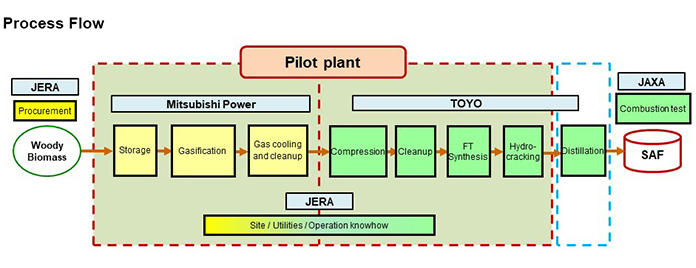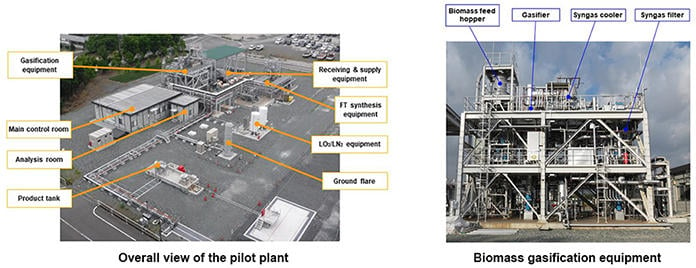Mitsubishi Power’s Gasification Technology Contributes to Supplying Sustainable Aviation Fuel from Woody Biomass for Regularly Scheduled Flight -- Entrained Bed Gasification Technology Contributing to Decarbonization in Aviation --
· Once-through production process for fuel jointly established with JERA, TOYO, and JAXA in project commissioned by NEDO
· Promoting the widespread use of sustainable aviation fuel, and contributing to 2050 carbon neutrality target
YOKOHAMA, JAPAN (June 18, 2021) - Mitsubishi Power, a subsidiary of Mitsubishi Heavy Industries (MHI) Group, has contributed to the world’s first supply of sustainable aviation fuel (SAF) for a regularly scheduled airline flight. The bio-jet fuel is a product of technology jointly developed by four companies to produce fuel from woody biomass under the “Development of Production Technologies for Biojet Fuels” project commissioned by the New Energy and Industrial Technology Development Organization (NEDO), Japan’s national research and development agency. This biomass-based jet fuel, produced using a biomass gasification and FT synthesis technology to synthesize liquid fuel from gasified woody cellulose, has been confirmed as compliant with the ASTM D7566 international standard for SAF. (Note1)
The development of this fuel production technology was conducted through demonstration experiments for once-through production of SAF using waste wood as raw material, at a pilot plant built on the grounds of the Shin-Nagoya Thermal Power Station (Nagoya, Aichi Prefecture) operated by JERA Co., Inc., one of the four consortium partners. The project brought together the technologies and expertise of the partners. JERA procured the raw material and operated the pilot plant, Mitsubishi Power conducted the gasification of the raw material utilizing entrained bed gasification technology (Note2), and Toyo Engineering Corporation (TOYO) handled the synthesis from gas and distillation of liquid fuel, and the building of a supply chain after mixture with petroleum-based jet fuel. The Japan Aerospace Exploration Agency (JAXA), Japan’s national aerospace and space agency, conducted evaluation testing of the SAF’s performance characteristics during combustion.
Mitsubishi Power has been conducting research and development on coal and biomass gasification since the 1980s, and has established advanced gasification furnace technologies. While drawing on its expertise in gasification for coal and biomass, this project has demonstrated Mitsubishi Power’s ability to utilize normobaric oxygen/steam-blown entrained bed gasification, the core technology for this project, to steadily and efficiently supply gas ideally suited for liquid fuel synthesis on a long-term basis. This equipment employs a gasification furnace able to handle biomass that is difficult to crush and has a broad particle size distribution. In addition, compared to other systems such as a fluidized bed gasification furnace, it is able to supply gas with a stable composition to the FT synthesis (Note3) equipment, allowing for stable production of large quantities of gas using this technology.
The International Civil Aviation Organization (ICAO), International Air Transport Association (IATA), and other organizations have presented a common theme to counter global warming by reducing emissions of greenhouse gases. The introduction of SAF in particular has been cited as an effective measure. In anticipation of the expected widespread utilization of SAF, the consortium members are working to ensure stable and efficient supply, paving the way for reducing greenhouse gas emissions in the global aviation industry.
Going forward, Mitsubishi Power will pursue measures to establish production technologies for bio-jet fuel, and by helping achieve decarbonization in aviation, contribute to the lessening of environmental loads.
Overview of the regular domestic flight using waste wood-derived SAF
- Date: June 17, 2021
- Flight number: Japan Airlines Flight 515
- Route: Tokyo (HND) to Sapporo (CTS)
- Aircraft: Airbus A350-900
- 1This SAF, a mixture of pure bio-jet fuel produced from woody biomass and conventional petroleum-based fuel (JETA-1), was certified as compliant with the ASTM D7566 Annex1 standard in March 2021.
- 2 Entrained bed gasification is a technique in which oxygen and steam are blown into the bottom of a special cylindrical gasifier, providing even and high-efficiency gasification of biomass.
- 3FT (Fischer-Tropsch) synthesis is a method of synthesizing liquid hydrocarbons from carbon monoxide and hydrogen through a catalytic reaction.


About MHI Group
Mitsubishi Heavy Industries (MHI) Group is one of the world’s leading industrial groups, spanning energy, logistics & infrastructure, industrial machinery, aerospace and defense. MHI Group combines cutting-edge technology with deep experience to deliver innovative, integrated solutions that help to realize a carbon neutral world, improve the quality of life and ensure a safer world. For more information, please visit www.mhi.com or follow our insights and stories on www.spectra.mhi.com.